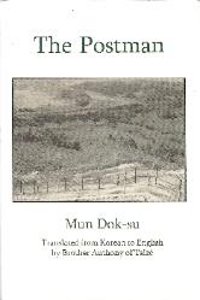
The Postman
by Mun Duk-su
Translated from Korean to English
by Brother Anthony of Taizé
87 pages, hardcover with jacket, price $26.00
ISBN 978-0-9824276-9-9
Description
Notes on the Author
The Postman is Mun Duk-su's latest output, which is a product of the period when his thoughts on life and the world and his notions on poetry are fully matured. He tries hard to find in the psychological and historical sites the roots of irrationality such as war, massacre, terror, and other anti-humanistic alienation phenomena, and transform them into clear physical images. He, on the one hand, searches out the root of "the lust for power," which can be said as the root of every modern irrationality, in the human mind, and on the other hand, finds the source of the conflict between the east and the west....
"There are few modern Korean poets who have pursued change as ardently as Mun Dok-su
has done. In his early days, he wrote Modernist poems engaged in the pursuit of
ontological issues, under the influence of Yu Ch'i-hwan. But before and around the
turn of the 21st century, as the spirit of the times were changing, he developed
an interest in the environmental issues associated with the so-called DMZ and produced
works that were deeply marked by Postmodernism. Nowadays, however, refusing to be
satisfied with that, he has chosen a method of composition deriving from Modernism
and has brought into the world a poem in cantos close to an epic, "The Postman:
Reborn, I Want to Become a Postman."
— from the Commentary by Lee Tae-Dong.
From The Postman:
| 1. Joseph Roulin | 4. DMZ |
|---|---|
|
In the jade-hued lake on the slopes of the hill behind your home, amniotic waters, you paddled. Playing with carp and snakeheads, eating water-chestnuts, you grew. One day a cord came flying, twined itself round your shoulders like the cords tied round the sacred tree beside a village shrine, and from it hung one postman's satchel, solitary, that never tore though it stretched, elastic. Empty, its circle like the Earth's orbit was plainly visible as an image of Dharma. Sunlight entered the chamber of Yuhwa1, Miss Kogury4, Yuhwa who met Kßmwa on the shores of dark blue Ubalsu, the sea where waves summon one another and blend; it impregnated her, made her pregnant, she laid an egg the size of a two-gallon pail, and your satchel is as large as that egg. It swells round as the belly of the Primal Mother who bore our nation; it's the bundle carried by a Buddhist monk. The gleaming yellow beard in Van Gogh's painting "Postman Joseph Roulin" descends from beneath the nose and both cheeks, circles the lips, wriggling zigzag like springs, divides into two, covers the chest, and in between the wide collar of a blue uniform suddenly looms. The top two of two rows of golden buttons on the jacket and a badge "Postes" clearly visible on the narrow-peaked cap he wears. His eyes are two green beads deeply inset. It must be said that his uniform would not suit you. His sweetheart and satchel would not do. Rags found washed up on a streamside, or ragged military garb discarded by a prisoner in a POW camp, that would be better. A rough cotton military uniform from the days of the 1592 invasions might be best. |
In the satchel, dancing on gaunt haunches, jerking, is a rifle broken in two like a stick. Iron bridges spanning the Yalu20 and Imjin21 rivers are mere toys. The caterpillar tracks of the Soviet-made T34s that startled the South that Sunday morning are nothing but paper, all crushed flat. There are many farewell messages, once tied round necks, fallen, the writers invisible now: where have all the addressees gone? Wearing helmets and long black boots from the mouth of the Imjin River via Kimhwa and Ch'olwon toward Kosong following the ups and downs of latitude is of no small importance. They swagger along as though it all belongs to them. Leaving behind the line where they confronted one another, guns aimed, South and North are each obliged to pull back two kilometers. Kindly hands drive in iron posts at regular intervals, drive them in with weighty hammers. They sink deep into earth soft as tender flesh. It hurts. Wearing helmets got from somewhere, they erect and unroll fences of barbed wire stretching 155 miles from west to east without a break. So land and nation are divided in two, divided at the waist, families separated, severed, a vortex of pain, grief, bitterness, tears that like clouds and winds and sky know nothing of North and South. Cranes lay eggs in nests on high pine-tree branches, squirrels, boars, hares frolic and play, in green groves the pale bodies of deer gleam occasionally, this DMZ inside its tangles of barbed wire. |

